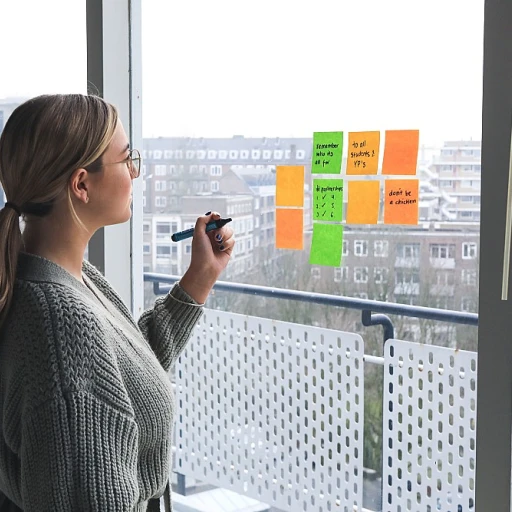Understanding the Role of a Team Player
Embracing the Dynamics of Team Play
In the corporate environment, the concept of a "team player" is often heralded as a valuable trait. Understanding what it means to be an effective member of a team can significantly contribute to one’s professional journey. The role of a team player extends beyond just participating in meetings and contributing to projects; it's about embodying certain qualities and attitudes that inspire and elevate the entire group's performance.
The essence of a great team player lies in the willingness to collaborate, communicate, and contribute positively within various team dynamics. This involves being proactive in sharing ideas and providing support where needed. It's crucial to understand that every player has a unique role to play, akin to positions in a sports team, where individuals must work in harmony to achieve a common goal.
As team members, fostering a spirit of cooperation and mutual respect can transform good teams into great ones. By adopting a coach's mentality—encouraging peers, providing constructive feedback, and leading by example—an individual can enhance the team’s overall effectiveness.
Moreover, being a good teammate means prioritizing the success of the 'team game,' which requires sacrificing personal playing time for the greater good when necessary. Supporting the team's mission, adapting to different situations, and being open to learning from teammates creates a high-performing and inclusive environment.
Incorporating empathy and emotional intelligence into your role can immensely help the team. Understanding your teammates' perspectives and being there to celebrate their successes and support during challenges can strengthen bonds and result in better team cohesion.
For those interested in deepening their understanding of how to become a better team player, exploring
the dynamics of teamwork in corporate culture can be particularly enlightening.
Communication Skills: The Backbone of Teamwork
The Art of Speaking and Listening Effectively
Effective communication is the backbone of any successful team. When team players articulate their thoughts clearly and listen actively, it fosters a better understanding among team members, paving the way for a high performing team environment. Clear communication helps in articulating the team's goals, and ensures that everyone is on the same page, ready to adapt to the challenges that come their way.
In a dynamic work setting, a great team hinges on a mix of verbal and non-verbal cues. Good teammates understand the power of both and utilize them to convey their message effectively. Consistent practice in these areas ensures no opportunities, or "game time," are missed due to misunderstandings.
- Verbal Communication: It's not just about speaking at the right time, but also about the words chosen and the tone used. Positive language encourages collaboration, motivating the team to work towards common goals.
- Non-Verbal Communication: Body language, eye contact, and gestures play a vital role in conveying sincerity and building trust among team members. A good teammate pays attention to these elements to foster a cohesive work environment.
Understanding and implementing effective communication strategies will ultimately help a team in many ways — from kickstarting productive discussions to resolving conflicts. Moreover,
engaging team building ideas for small groups can further enhance this communicative efficiency.
Adopting these communication practices not only enhances individual roles within a team but also contributes to the building of great teams. This is because a team great with communication is inherently equipped to face challenges, leveraging the best ideas from each team member. Remember - it’s the effective exchange of ideas that defines the success of any team player.
Adaptability and Flexibility in Dynamic Work Environments
Embracing Change and Staying Agile
In today's fast-paced work environment, adaptability and flexibility have become essential qualities of a high-performing team. A great teammate knows that change is inevitable and is not only willing to embrace it but also excels at navigating through dynamic situations. This quality helps ensure that the role within the team remains effective and relevant, aligning with the overall objectives and goals.
Being adaptable means being open to new ideas and approaches. It involves a willingness to shift strategies and embrace innovative solutions to help the team overcome challenges. High-performing teams rely on this ability to make better decisions quickly and efficiently, ultimately leading to improved outcomes and success.
Similarly, flexibility allows team players to manage multiple tasks and roles effectively. This is especially important when team dynamics change, new projects arise, or existing priorities evolve. Good team members understand that fluidity in roles and responsibilities can enhance productivity and foster a positive team culture over time.
Moreover, adaptability and flexibility promote a culture of continuous improvement and learning. When team members are open to change, they are also more likely to seek feedback, learn from experiences, and cultivate their skills. This not only benefits individual growth but also enhances the collective capabilities of the team. By being receptive to change and maintaining an agile mindset, team players contribute to building great teams that thrive amidst varying circumstances.
For team players wanting to develop these critical skills further, resources like
enhancing relational skills offer valuable insights into understanding and strengthening team dynamics.
Empathy and Emotional Intelligence
The Role of Empathy in Team Dynamics
In the constantly evolving landscape of corporate culture, being an effective team player requires more than just technical skills and strategic acumen. It is the softer traits, such as empathy and emotional intelligence, that often distinguish a good teammate from a great one.
Empathy involves understanding and sharing the feelings of others, but it is more than just being sympathetic. It is about stepping into the shoes of your teammates and comprehending their perspectives. In the context of team dynamics, this quality is invaluable. Empathic team members can bridge communication gaps, foster a positive work environment, and pave the way for better collaboration.
- Building Trust and Connection: Empathy creates a strong bond among team members, enhancing trust and mutual respect. When team members feel understood and valued, they are more likely to engage openly and honestly. This openness leads to high-performing teams where each player feels empowered to contribute their best.
- Facilitating Positive Conflict Resolution: Conflicts are inevitable in any team. However, with empathy, players can approach disputes with an open mind and resolve issues effectively without damaging relationships. It encourages a collaborative approach to problem-solving, where every viewpoint is considered, leading to creative and inclusive solutions.
- Nurturing a Supportive Environment: Good teammates lift each other up. Being aware of your teammates' strengths and limitations enables the team to support and compensate for one another’s weaknesses. Encouragement, complemented by understanding, fosters a more supportive and inclusive team culture.
Developing empathy and emotional intelligence is not only about becoming a better teammate but also about being a better individual both personally and professionally. It transforms good team members into integral parts of not just good teams, but great teams.
To cultivate these traits, it’s essential to practice active listening, acknowledge diverse perspectives, and engage in open communication with your teammates. Great teammates don't just play the game; they change it for the better.
Accountability and Reliability
Taking Responsibility for Your Actions
In any team setting, each team member must embrace accountability and reliability as cornerstones of being a high-performing team player. Trust is the currency of great teams, and it can only be built when players understand and take ownership of their actions. This responsibility goes hand-in-hand with effective communication and adaptability, ensuring that team dynamics remain fluid and constructive.
Being reliable means that your teammates can depend on you to meet deadlines and commitments consistently. This concept transcends being a great teammate; it’s fundamental to maintaining the integrity of the group’s work. In occasions where a task hasn't been completed or a mistake is made, being prompt to acknowledge it and take corrective actions is crucial. This not only fosters a culture of trust but also displays your commitment to the team's success.
Moreover, accountability doesn’t end with simply acknowledging your tasks. It extends to supporting your fellow team members to ensure collective goals are achieved. Recognizing how your contributions influence the overall team performance can encourage you to strive towards being the best at your role.
To create a better team atmosphere, cultivate a personal ethos where accountability becomes second nature. By practicing this quality, you not only help the team achieve its objectives but also inspire others to do the same. In essence, reliable and accountable players are at the heart of any great team culture, driving forward the mission with dedication and shared responsibility.
Encouraging a Positive and Inclusive Team Culture
Fostering a Positive Team Environment
Creating a positive and inclusive team culture is essential for cultivating a high-performing team. A supportive atmosphere not only boosts morale but also encourages team members to engage more fully with their work and with each other. Here’s how you can contribute to such an environment:
- Celebrate Diversity: Recognizing and embracing the unique perspectives and skills of each teammate is a fundamental aspect of inclusive teamwork. This diversity can drive innovation and creativity, leading to better solutions and stronger team performance. Encouraging all voices to be heard can strengthen team cohesion and make team players feel valued.
- Promote Open Communication: As highlighted earlier, communication skills are the backbone of good teamwork. Great teammates understand that expressing thoughts openly and listening actively are key to resolving conflicts and building trust. When team players feel heard and understood, they are more likely to contribute positively and stay engaged.
- Encourage Collaboration over Competition: While some level of friendly competition can spur motivation, it’s vital to prioritize collaboration. Effective team players focus on common goals and advocate for shared successes rather than individual accolades. This approach helps in cultivating a spirit of unity and cooperation.
- Model Positive Attitudes: Great teammates set the tone by maintaining a positive attitude, even in challenging situations. By demonstrating optimism and resilience, you encourage others to adopt similar behaviors. Positivity can become contagious and lead to a more enjoyable and effective work environment.
- Be a Reliable Teammate: Being accountable and dependable, as previously discussed, reinforces trust among team members. Reliability in fulfilling your role and responsibilities lends credibility to your commitment and helps maintain smooth team operations.
A positive team environment does not happen overnight, but with time and consistent effort, it can be nurtured effectively. Through the collective practice of these qualities, great teams emerge, characterized by strong bonds and collaborative spirit.














